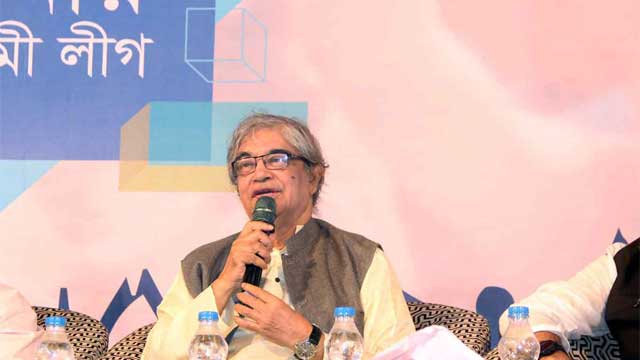In an interesting turn of events, Posts, Telecommunication and Information Technology Minister Mustafa Jabbar yesterday said government will start directly "intervening" in any content on social media from next September using “collected technology.”
Saying that the state can control any website if it wishes to, he said: "From September, we hope to intervene regarding any content uploaded on social media platforms, such as Facebook or YouTube."
Jabbar was addressing an event organized by Awami League's publicity wing at Shilpakala Academy in Segunbagicha, Dhaka.
Jabbar said it is a major achievement that the government has acquired the ability to control any website. "We gained this power right before the last national election."
The minister said the crisis the government faces is that it cannot take immediate steps to control posts and videos posted on social media.
"The government cannot intervene yet regarding content uploaded on platforms such as Facebook and YouTube, because they have to comply with the 'American Community Standard,'" he said.
"But the good news is, we hope to overcome this issue in September this year when the government will have the power to intervene directly," Jabbar said. "This means that nobody will be able to circulate anything on a whim."
Later in the day, the minister told the newspaper that the government has been working on a “safe Internet” campaign since January. As part of that campaign, a significant number of porn and gambling sites have been blocked.
“Much pornographic content from YouTube has also been taken down,” he said, adding that the government also blocked a number of fake Facebook accounts and those used for teasing girls.
“Our main goal is to stop crime on social media,” the minister maintained.
When asked if the move can be termed content filtering, he answered in the negative, recalling that he had a meeting with a Facebook official in Spain last February about the issue.
“But we did not manage to discuss the matter with the YouTube authorities,” he said, adding: “We urged them to create content that follows our social standards.”
Replying to a question if home-grown technology will be used to control the content, Jabbar said: “We will use the same collected technology that the entire world does, to this end.”
Reaction from activists, experts
Slamming the government move, human rights activist Advocate Sultana Kamal said: “Except social awareness, the state’s intervention cannot stop the abuse of social media.
“The decision to control will take a heavy toll on the freedom of speech and thought,” she observed.
Sultana Kamal suggested that controlling social media content may bring a temporary solution, but it will be able to do nothing in the long run.
The government must come to a final decision taking social, cultural, and political aspects into consideration, the rights campaigner said.
She said that the government always blames a vested quarter for rumors and propaganda on social media, but never reveals who those people are.
Supreme Court lawyer Jyotirmoy Barua said the government initiative will deepen legal complications relating to social media.
“Why does the government have to block or control a Facebook post or YouTube content before a court motion?” he asked.
Saying that the country’s political area has not been vibrant for quite a long time, Jyotirmoy suggested: “Many are raising their dissenting voices on social media, which will be badly hampered once the controlling starts.”
He warned that intervention in the freedom of speech will cause dire consequences as it is a move that violates the constitutional rights of a person.
“Article-39 of the constitution has some provisions to restrict the freedom of expression, but it does not entirely clarify the parameters in this regard,” the lawyer said.
Cases under the Digital Security Act (DSA) will increase notably, he feared, adding that the law can also be used as a tool to scare dissenters into silence.
Government is introducing a ‘content filtering’ mechanism to prevent the spread of rumours and propaganda on social networking sites.
The government has long been talking about content filtering on social media for a safer internet. Rumors and propaganda using social media intensified especially around the 11th national elections.
From then on the government started a crackdown on so called fake Facebook IDs and provocative content. A similar clampdown was also launched on pornography, causing over 20,000 sites to be blocked.
Somewhereinblog.net, the largest Bengali blogging site, and Google Books, were also blocked in late February as part of the move.
The police also interrogated YouTube star, actor, and model, Salman Muqtadir, concerning ‘controversial videos’ and social media star, Sanai Mahbub, in the campaign against adult content online.
A number of people have also been arrested under the DSA over supposedly controversial Facebook posts. To date, 28 chargesheets have been submitted in a number of much talked about cases.
Notably, protests sparked in May after poet Henry Sawpon and lawyer Imtiaz Mahmud were arrested and sent to jail for ‘hurting religious sentiments’ with their posts.





